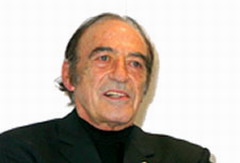I play to invoke feelings not to dazzle
- Submitted by: admin
- Arts and Culture
- Events
- International
- Music
- South America
- 02 / 19 / 2007

By: Pedro de la Hoz
This happened to Miguel Angel Estrella in the southern winter of 1977, after having been kidnapped back in February in Montevideo, Uruguay by forces working under Operation Condor (a program implemented in the Southern Cone of South America for cross border elimination of all opposition to the military dictatorships). Estrella was already a famous piano player and decided to spend some time in Uruguay after being threatened by the dictatorship in his country. "I had finished a tour in Europe when at the Madrid airport I ran into Colonel Ramirez, a sinister individual who had been a henchman of Jose Lopez Rega and Isabel Martinez de Peron. With great cynicism he insinuated that I was escaping from the country and I responded that no, I was returning. But just in case, I stayed in Montevideo, and I sent my assistant for my young children. I had become a widower. I truly never thought they would dare go so far and therefore rejected an offer from General Omar Torrijos to live and work in Panama, although later, right when they kidnapped me, I was planning to move to Mexico where I had sure work. However, I erred in my calculations."
Miguel Angel tells me about that horrible experience. He does it on a hazy Havana morning with a cool breeze coming in over the Malecon sea wall. He is part of the delegation from Argentina, guest of honor at the 16th Cuban International Book Fair. For more than 40 years his name has been highly sought after on the international concert music circuit. He is an exceptionally talented pianist with an undisputed worldwide prestige.
"But look what a paradox, "he comments" I, who have always stayed away from the aristocracies, have to thank the Queen of England for having been moved from the category of missing person to prisoner. My friend Yehudi Menuhim, who, as you know, is one of the great musicians of our time, asked the Queen to mediate. She sent an emissary to tell the Uruguayan military her concern for my case. She even offered a piano so that I wouldnt lose my talent while in jail. Of course there was never any piano, but at least I left the anonymity of the missing persons until international solidarity helped lead to my freedom in 1980."
Having reentered society, Estrella had to be firm in his convictions to not succumb to the temptations of the market. "Some record executives came to me and proposed fabulous business ideas. All I had to do was let them exploit my condition as an ex-missing person and ex-political prisoner. One even went so far as to imagine a cover of a record in which I would have had posed in handcuffs. What a disgrace! My art had never had or has anything to do with this, not even with the competition. Its so conceited to be ranked in the market, to go around saying that youre on the list of the five or ten best in the world."
Among the beautiful idealist acts of Miguel Angel was the creation of the Musica Esperanza Foundation in 1982. To put music at the service of humanity and the dignity of each person. To take music to all sectors of society. To strengthen peace by returning to music its role as a bridge of communication and solidarity between individuals and between peoples. Those are his objectives.
"In some way its about trying to be consistent with myself and the memory of my partner Martha Gonzalez, the mother of my children. She was a follower of Ernesto "Che" Guevarra. The day we learned they had killed Che she cried as if she had lost a close relative. It was that same year, 1967, when we had a very tumultuous night, in which she left nothing unsaid. It all happened because the King of Norway had agreed to an official reception from the dictatorship of Juan Carlos Ongania in which I was supposed to play a sonata of Beethoven, something that didnt happen because the guests were talking loud and madly downing liquor. And yes, I committed the sin of shaking the hand of the tyrant. When we left, Martha told me: Miguel youve got to decide your course. Its now or never. From then on I decided not to play to dazzle but to evoke feelings."
Each year, Estrella performs close to a hundred recitals or concerts. About 40 percent would be enough to live on and guarantee his future. The rest, the majority, are dedicated to social causes or his Musica Esperanza Foundation.
"I havent made a career. Thats a word that doesnt go well with me. Im a social musician. Believe me; my greatest pride is having been named the artistic spokesperson of the sugar cane workers of Tucuman."
Comments